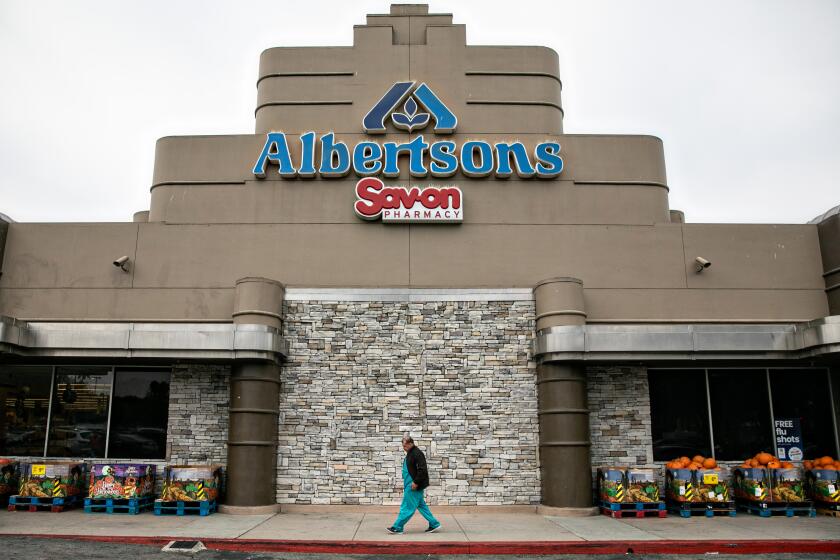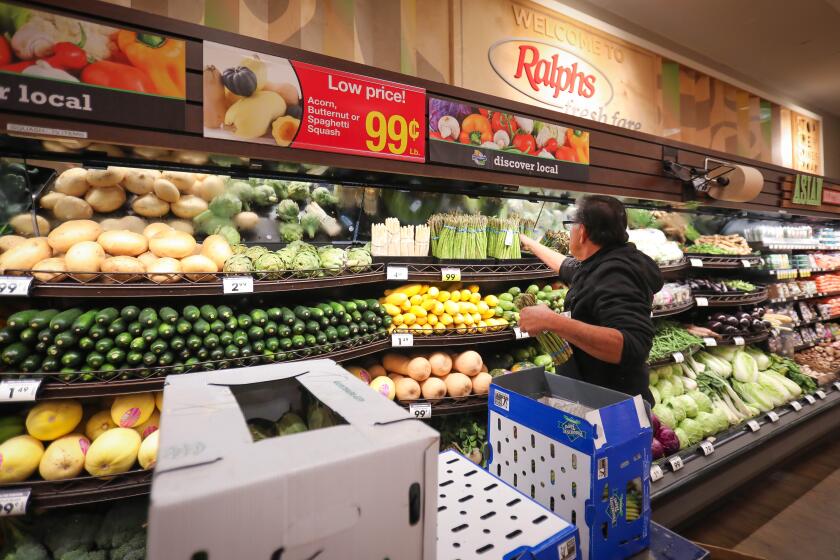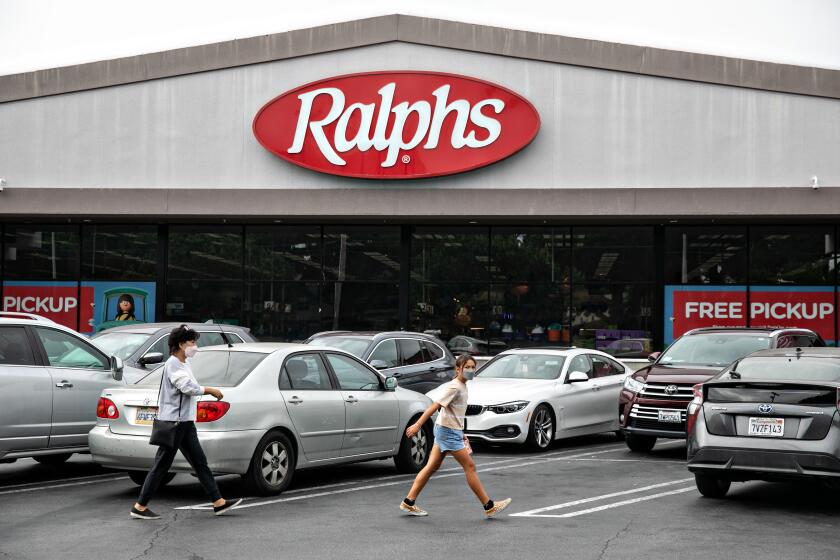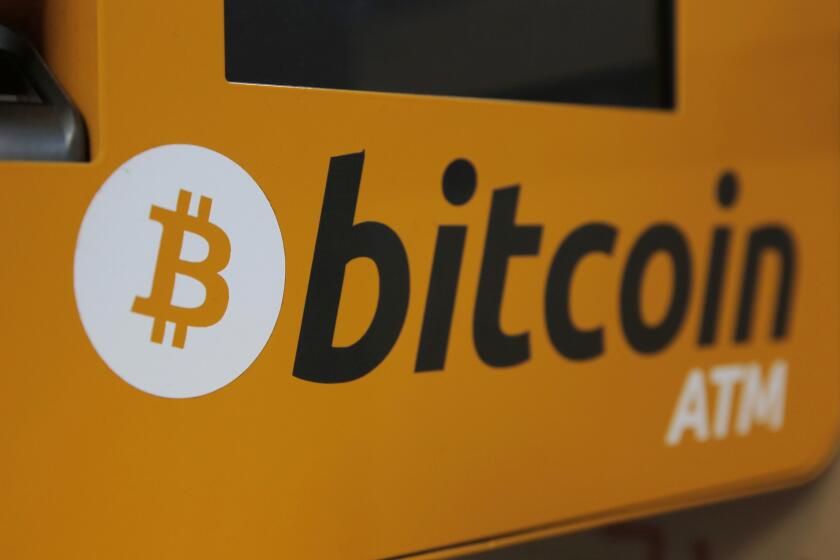Kroger, Albertsons bracing for FTC decision on merger in January

Kroger and Albertsons are bracing for a possible Federal Trade Commission lawsuit over their proposed $24.6-billion merger as soon as January as opposition builds against the supermarket mega-deal.
Progressive lawmakers and the Teamsters union urged the agency this week to veto the deal after its yearlong probe. The FTC has until Jan. 17 to decide on Kroger’s takeover of Albertsons under a timing agreement the companies reached with the agency, according to a court filing in a class action brought by consumers opposed to the deal. The agency’s deadline hadn’t been disclosed previously.
The agency has been in talks with state attorneys general, who are also reviewing the deal, and could sue to block the transaction or agree to a settlement proposed by the companies.
The divestiture of more than 400 of the two companies’ stores as part of the deal is going to be a “difficult sell” with the FTC, said Bill Kovacic, a former agency chair who now teaches antitrust at George Washington University Law School. The agency has long been concerned about the adequacy of selling off stores in retail and grocery mergers, and the current FTC is very vocal on this point, he said.
“The FTC is doing their homework,” he said. “They’ll be prepared to be in the courtroom.”
The model for the first supermarket forces grocery stores to chase higher volume to fund cheaper prices. For chains like Kroger and Albertsons, this means growing bigger is your only chance at survival.
The merger of the two largest supermarket chains has drawn ire over concerns it would reduce consumer choices and undermine bargaining power of workers. And while the companies have proposed to sell a batch of stores to Piggly Wiggly chain owner C&S Wholesale Grocers to resolve the antitrust concerns, that remedy has drawn even more fire because of the buyer’s history of reselling supermarkets shortly after acquiring them and moving work away from unionized facilities.
The merger would mean “lower prices and more choices for fresh food for customers and more investments in our communities,” a Kroger spokeswoman said in a statement. “If the merger is blocked, the nonunion retailers like Walmart and Amazon will become even more powerful and unaccountable — and that’s bad for everyone,” she added.
A spokesman for Albertsons said in a separate statement that the merger would “ensure that our neighborhood supermarkets, some of which have been serving their communities for over 100 years, can better compete” against Amazon.com and Walmart.
The FTC declined to comment.
FTC Chair Lina Khan has attended listening sessions in Colorado, Arizona and Nevada, where she criticized settlements from previous supermarket mergers. Before becoming chair, Khan called the divestitures in the 2015 Albertsons-Safeway deal an instance of a “spectacular” failure on the part of antitrust enforcers.
Albertsons and Kroger say their merger would benefit consumers. The history of mergers, in the grocery business and elsewhere, offers cause for skepticism.
A combined Kroger-Albertsons would have nearly 5,000 stores across the country merging the banners of Kroger, Ralphs and Harris Teeter with Albertsons, Vons, Safeway, Acme and Jewel-Osco, among others. That would put it on par with Walmart, which had 5,215 locations between its stores and warehouse retailer Sam’s Club as of Oct. 31.
The two biggest grocers in the U.S. compete head to head in dozens of markets — in 2021, Kroger listed Albertsons as one of its two biggest rivals in 14 major metro areas, including Los Angeles, Dallas-Fort Worth, Denver and Phoenix, and 18 smaller ones such as Anchorage, Alaska, and Santa Barbara.
To reduce the antitrust concerns, the companies agreed to divest 413 stores to C&S along with Quality Food Centers, Mariano’s and Carrs brands and eight distribution facilities.
The proposed divestiture to C&S would more than triple the number of stores it operates and expand its business to the West Coast, where the company has a limited presence.
But C&S has frequently offloaded the supermarkets it has bought, said Krista Brown, a senior policy analyst at antitrust advocacy group American Economic Liberties Project. After buying more than 185 Grand Union supermarkets when that company went bankrupt in 2000, C&S later resold most of them and within six years operated only about 30 supermarkets.
“C&S has not proven itself to be a successful operator,” Brown said. “This proposed divestment is far from creating a potential viable competitor.”
Albertsons says a controversial $4-billion merger dividend is part of its growth strategy. How is taking on debt to funnel money to insiders helping it grow?
The Teamsters union, which represents 22,000 workers at Kroger and Albertsons, also came out strongly against the proposal this week, saying it would probably cut 1,200 jobs within months.
“C&S has driven one grocery business after another into the ground for 30 years,” said Tom Erickson, director of the union’s warehouse division. “This anti-union company has just one playbook when it comes to acquiring Teamster companies or grocery distribution contracts where our members work: close it down, bail on pensions, and move the work to one of their nonunion sites.”
Teamsters represents many warehouse employees and truck drivers, while United Food and Commercial Workers International mainly represents in-store workers. UFCW also opposes the deal.
C&S didn’t respond to requests for comment.
C&S’ small position in the grocery market may raise red flags for antitrust enforcers after the failure of Albertsons’ last spinoff. In 2015, the agency allowed Albertsons to buy Safeway after it sold 168 stores, the bulk of them to Washington state grocer Haggen Holdings. Less than a year later, Haggen filed for bankruptcy protection and Albertsons bought back a number of the stores.
Some of those same stores could be switching hands again: The grocers said they plan to sell 104 stores in Washington state to C&S.
California is among the states most affected by the deal: A combined Kroger and Albertsons would have 895 stores in the state, though they pledged to sell at least 66 of them to C&S. In October, California Atty. Gen. Rob Bonta told reporters his office was considering a suit, though no final decision had been reached.
California is preparing a lawsuit to block Kroger’s $24.6-billion acquisition of Albertsons on concerns the deal could hurt consumers and workers.
A group of progressive lawmakers including Sens. Elizabeth Warren (D-Mass.) and Bernie Sanders (I-Vt.) cited the Haggen bankruptcy in a letter to the FTC this week calling on the agency to block the deal. The members of Congress said the C&S divestiture wouldn’t ameliorate the harms to competition posed by the merger.
Alaska’s lawmakers, including both Republican senators and the state’s lone Democratic representative, have also expressed concern about the deal given its impact in the state.
More to Read
Inside the business of entertainment
The Wide Shot brings you news, analysis and insights on everything from streaming wars to production — and what it all means for the future.
You may occasionally receive promotional content from the Los Angeles Times.














